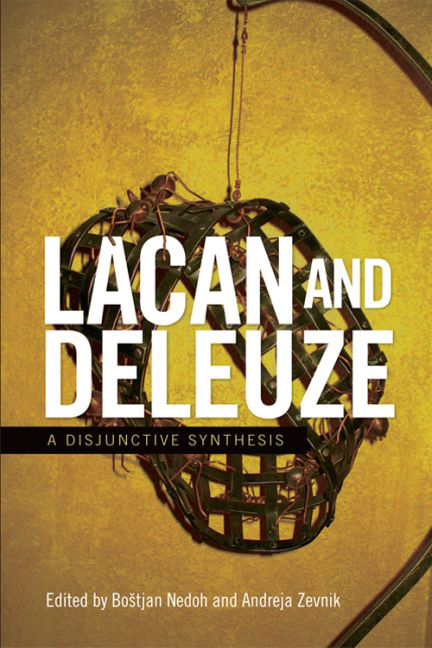Book contents
- Frontmatter
- Contents
- Acknowledgements
- Introduction: On a Disjunctive Synthesis between Lacan and Deleuze
- 1 For Another Lacan-Deleuze Encounter
- 2 Reciprocal Portrait of Jacques Lacan in Gilles Deleuze
- 3 Does the Body without Organs Have Any Sex at All? Lacan and Deleuze on Perversion and Sexual Difference
- 4 Gnomonology: Deleuze's Phobias and the Line of Flight between Speech and the Body
- 5 Lacan, Deleuze and the Politics of the Face
- 6 Denkwunderkeiten: On Deleuze, Schreber and Freud
- 7 Snark, Jabberwock, Poord'jeli: Deleuze and the Lacanian School on the Names-of-the-Father
- 8 Baroque Structuralism: Deleuze, Lacan and the Critique of Linguistics
- 9 Exalted Obscenity and the Lawyer of God: Lacan, Deleuze and the Baroque
- 10 The Death Drive
- 11 Repetition and Difference: Žižek, Deleuze and Lacanian Drives
- 12 Lacan, Deleuze and the Consequences of Formalism
- Notes on Contributors
- Index
9 - Exalted Obscenity and the Lawyer of God: Lacan, Deleuze and the Baroque
Published online by Cambridge University Press: 20 April 2017
- Frontmatter
- Contents
- Acknowledgements
- Introduction: On a Disjunctive Synthesis between Lacan and Deleuze
- 1 For Another Lacan-Deleuze Encounter
- 2 Reciprocal Portrait of Jacques Lacan in Gilles Deleuze
- 3 Does the Body without Organs Have Any Sex at All? Lacan and Deleuze on Perversion and Sexual Difference
- 4 Gnomonology: Deleuze's Phobias and the Line of Flight between Speech and the Body
- 5 Lacan, Deleuze and the Politics of the Face
- 6 Denkwunderkeiten: On Deleuze, Schreber and Freud
- 7 Snark, Jabberwock, Poord'jeli: Deleuze and the Lacanian School on the Names-of-the-Father
- 8 Baroque Structuralism: Deleuze, Lacan and the Critique of Linguistics
- 9 Exalted Obscenity and the Lawyer of God: Lacan, Deleuze and the Baroque
- 10 The Death Drive
- 11 Repetition and Difference: Žižek, Deleuze and Lacanian Drives
- 12 Lacan, Deleuze and the Consequences of Formalism
- Notes on Contributors
- Index
Summary
It is well known that both Deleuze and Lacan pay considerable attention to the baroque. Deleuze centres his 1988 book The Fold on this topic. Lacan dedicates to it some intense passages of a crucial lesson of his 1972–3 Seminar Encore, which could rightly be regarded as a summary of this work, if not of his late teaching.
For Deleuze, the baroque takes an interest in all the places ‘where what is seen is inside: a cell, a sacristy, a crypt, a church, a theatre, a study, or a print room’, and extracts power and glory from them. As such, however, it does not point at any hidden essence, but at a basic ‘operative function’, namely folding; the baroque ‘does not stop creating folds’. Ultimately, the fold amounts to power, a power inseparable from the infinite act of folding, whereby being as multiple and thus non-universalisable remains nonetheless univocal. What is at stake both aesthetically and ontologically is in the end a ‘new harmony’. The philosopher who has fully grasped the theoretical implications of the baroque as folding is Leibniz. Deleuze's own thought proposes itself as a contemporary resumption and expansion of the baroque and of Leibniz. Quite explicitly: ‘we are discovering new ways of folding, akin to new envelopments, but we remain Leibnizian because it is always a matter of folding, unfolding, refolding’.
On the other hand, for Lacan, the baroque amounts to the ‘exhibition of bodies evoking jouissance’. This aesthetical dimension works as a cipher for a fundamental characteristic of being in general: being does not think. Or specifically: it is incorrect to think that ‘what is thought of is in the image of thought, in other words, that being thinks’. Even more precisely: ‘being by speaking enjoys’, yet what it enjoys is ‘insufficient jouissance’. In knowing this insufficient jouissance, and enjoying this very knowledge, the speaking/thinking being does not want to know anything else about it. Thus, the being that in speaking supposedly thinks does not itself really think. Thanks to its visual and plastic orgies of suffering bodies, the art of the baroque counters this state of generalised repression – which ultimately amounts to knowledge tout court, or even civilisation tout court.
- Type
- Chapter
- Information
- Lacan and DeleuzeA Disjunctive Synthesis, pp. 141 - 162Publisher: Edinburgh University PressPrint publication year: 2017



